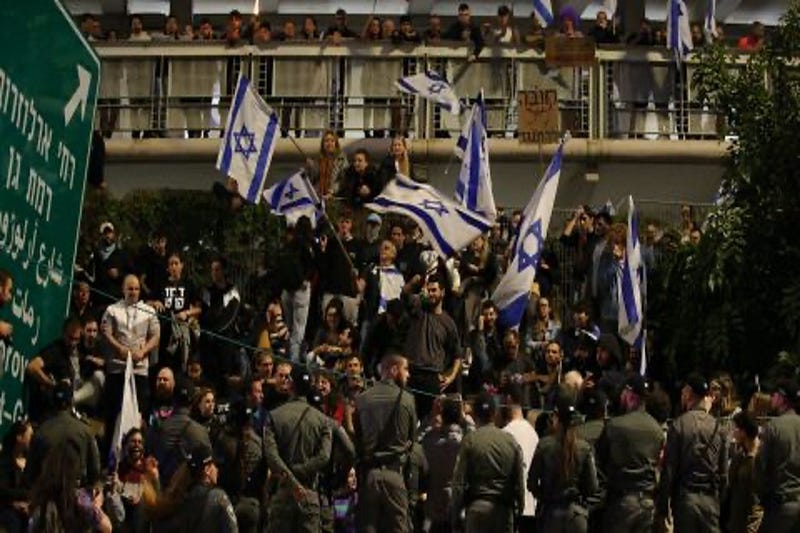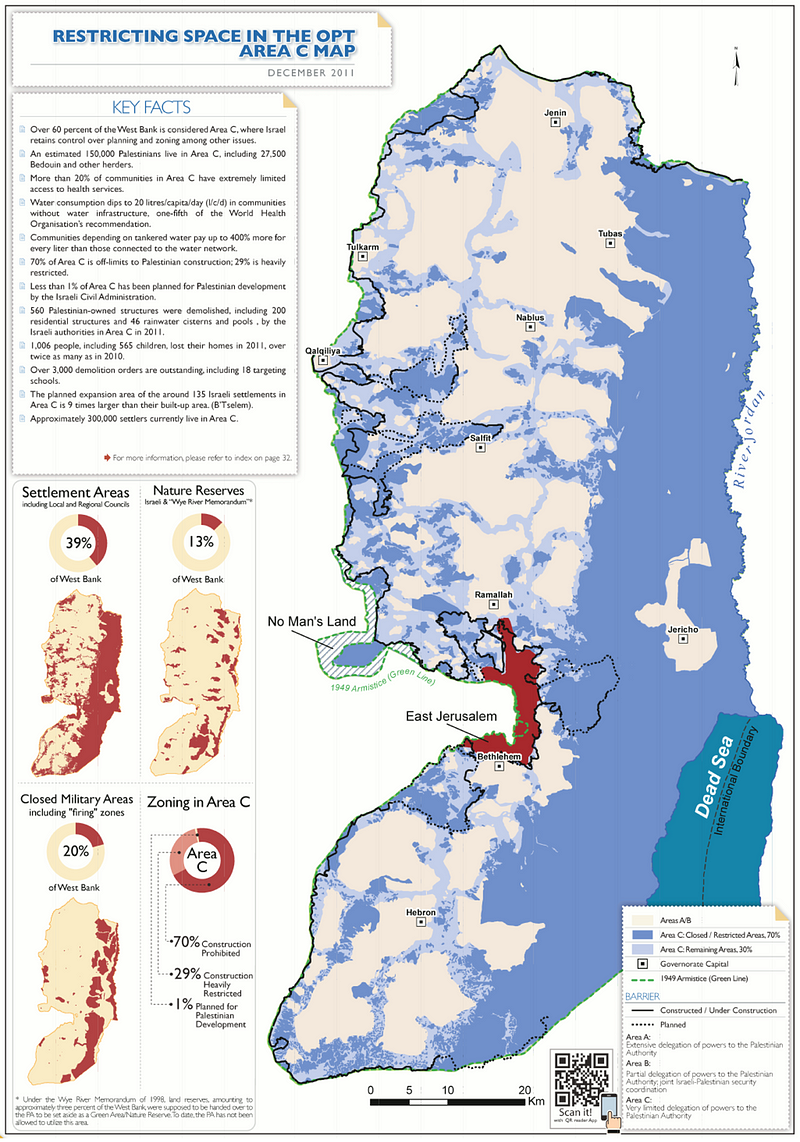A Constitutional Crisis in Israel
It Could Create New Possibilities for Peace in the Middle East
Protests are raging across Israel as over half a million protestors (roughly 5% of the nation’s population) gathered on Saturday night to decry the prime minister’s plan to overhaul the judiciary. It is the biggest protest in Israel’s history.

Israelis take part in a rally in Tel Aviv on Saturday to protest major changes to the country’s judicial system. Source: Mostafa Alkharouf/Anadolu Agency/Getty Images via CNN.com
This was only the latest salvo in the ongoing revolt. Parts of the military and civil service have said they would refuse government orders if the reforms proceed. Most notably, 37 of the 40 pilots in the elite Israeli Air Force’s 69th Squadron have said they won’t report for training. Tech workers have gone on strike, disrupting one of the small country’s most important industries. The police chief of Tel Aviv joined the protest in uniform, even after being fired by the National Security minister and then reinstated by the attorney general.
The crisis stems from Netanyahu’s far-right coalition seeking to place the nation’s independent institutions under greater political control. This aligns with Netanyahu’s interest in deferring the ongoing criminal case against him for breach of trust and corruption. The insistence of the government on these reforms in the face of widespread public opposition comes at a perilous time.
There has been a recent spike in violence in the West Bank. Israeli settlers turned rioters have targeted Palestinians. In many instances, the Israeli Defense Forces have enabled these riots or at least ignored them. The latest incident two weeks ago was triggered by the shooting of two Israeli brothers by a Palestinian gunman. In retaliation, a mob of Israeli settlers attacked the village of Harawa, torching multiple vehicles and homes. A day later, a Palestinian open-fired on an Israeli motorist outside Jericho, killing him.
The violence is exposing the radicalism of many in Israel’s current governing coalition, and risks causing a fracturing of the government. High-ranking officials, including the finance minister, openly supported the violence in Hawara, even calling to raze it to the ground. This led Netanyahu, not one to discourage his right flank, to give a speech asking Israelis to refrain from mob justice and opposing anarchy. He fears he is losing control of the security situation, enough to risk fissures in his governing coalition.
Unfortunately, these incidents are reminiscent of the pogroms that Jews faced in Eastern Europe before World War II and highlight the effective second-tier citizenship status of the Palestinians in the West Bank. How did we get to a situation where an emboldened Israeli far-right feels it can encourage violence against the Palestinians and reshape Israeli democracy according to its whims? It begins with how they have successfully leveraged international support for maintaining a Jewish state into a blank check for military support by the United States and stronger and stronger measures to make a single Jewish state an inevitability.
The spark of the Israeli ultra-nationalist movement goes back to its founding. Britain partitioned Palestine into two separate states: one for Jews and the other for Arabs. This was reminiscent of the partition of India into Hindu and Muslim states, with the attendant dislocations and violence. Arab Palestinians were to be forced from their homes in the Jewish section and forcibly relocated. When Israel was founded in 1948 and declared a Jewish state, instead of accepting the British partition plan into separate Jewish and Palestinian states, the surrounding Arab states declared war and attempted to destroy the nascent state, out of motivation to preserve the homeland of the Arabs, religious animosity, and geopolitical considerations The result was an unlikely Israeli victory, the integration of all of Palestine but the West Bank and Gaza strip into the Jewish state, and a forced relocation of much greater numbers of Palestinians.
The West Bank and Gaza were annexed by Jordan and Egypt respectively. The claim of the Palestinians to their seized lands was legitimate, but also seen within Israel as a way for the surrounding Arab states to stake claims to their nation. None recognized the new state. Understandably, this history of warfare created hostility between the Israelis and Palestinians and empowered nationalists on both sides. The West Bank and Gaza were placed under military occupation by Israel in 1967 after the Six-Day War against Syria, Jordan, and Egypt.
Israel continued to hold these territories under military occupation until the Oslo Accords of 1993. In the meantime, the Palestinian Liberation Organization was founded by a coalition of Arab states in 1964 to provide political representation of the Palestinians in the occupied territories. Due to ongoing sectarian violence and backing by states that on multiple occasions had tried to destroy Israel, naturally, the PLO was seen as a terrorist group and as a fifth rail to influence Israeli governance. This again empowered nationalists, as the Israeli right would not accept a peace deal that created an Arab state perceived as hostile within Israel’s borders. Palestinians, similarly, would not accept anything short of their state, having been forcibly removed from their homeland.
What did the Oslo Accords do? They divided the West Bank into three types of territories. Area A had full PLO political and security control, Area B had PLO political control and joint Israeli security, and Area C had full Israeli political and security control. Area A territories were not geographically contiguous and separated as islands within a sea of Israeli control. This made the eventual union of these territories into a single Palestinian state unrealistic and was therefore the only deal Israel would accept. It ratified a de-facto arrangement of Palestinians living under a distinct political arrangement from the Israelis within the same state. A sort of apartheid.
The idea was to freeze the current extent of Israeli and Palestinian lands in place, but as stated before, the presence of what was arguably an Arab fifth rail within a Jewish state only empowered the nationalists, who pushed for continued Jewish settlements in the West Bank within Area C, including demolition of existing Palestinian settlements. Netanyahu’s first government aggressively supported the settlements, going so far as to fully integrate them into Israel. The goal is the full integration of Area C into Israel, making the formation of a contiguous Palestinian state an impossibility.
Jewish settlers will not be leaving the West Bank soon, and the Palestinians will not be leaving either. A country that tolerates ultra-nationalists in its government will not tolerate a two-state solution, or one that gives the PLO or Hamas significant autonomy while violence continues and relations with the other Arab states are hostile. At this time, under current conditions, the only viable outcome is the current apartheid arrangement, or a slow-motion ethnic cleansing (represented by encroaching Israeli settlements and sectarian violence).
Because of this hostility, the political groups with the most leverage are the ultra-nationalists in Netanyahu’s coalition and the militants among the Palestinians. This has given the Israelis the right impunity to continue to escalate the situation and justify entrenching their power because of “security”. This is manifesting itself in a nationalist prime minister, who is under criminal trial for abusing his power, abusing his political party’s power by undermining judicial independence, and causing a backlash that could cripple Israel. He then further compounds this abuse by tolerating the ultra-nationalist pro-riot and ethnic cleansing faction in his coalition that is fomenting violence that further undermines his country’s security.
This situation cannot continue, and the international community must consider how to change the circumstances causing this escalatory spiral. Ironically, the Trump administration might have stumbled into the solution. The dynamic of the Palestinian governments being backed by countries that refuse to recognize Israel and have significant historical and cultural grievances, and often indulge in acts of terrorism, is a major contributor. Normalizing relations between Israel and the surrounding Arab states can change this.
The Abraham Accords between Israel, the United Arab Emirates, and Bahrain established a framework for this normalization. Of course, in Trumpian fashion, this arrangement involved self-dealing behind the scenes to shore up the Trump family’s financial position. However, many political agreements involve this type of petty corruption, so the benefits should not be summarily dismissed. The Biden administration can build on this by ensuring that negotiations do not occur through back-channels and that concessions traded between governments do not involve the personal finances of the negotiators.
Morocco, Jordan, and Sudan have also normalized ties, and negotiations now include Saudi Arabia, Indonesia, Mauritania, Nigeria, and Somalia. Israel and Saudi Arabia have cultivated unofficial ties for several years, though they remain without official diplomatic relations. In exchange for normalization, the Saudis desire security guarantees and help to jumpstart a civilian nuclear energy program. With the recently announced normalized ties with Iran, this should not be a major burden for the United States. Notably, the Saudis have not sought concessions on the Palestinian issue, indicating that they are cooling on leveraging the PLO as a geopolitical tool.
With improved security conditions in the Middle East, and normalized ties with Arab states, the potential security concerns within Israel towards the PLO would be reduced, and the ethnic tension somewhat reduced. Israel would not have to maintain the same extreme security posture, and the boon this has given the ultra-nationalists would be removed. This obviously would not resolve the issue, but other paths towards eventual resolution would open. Perhaps Israel could offer full citizenship to the West Bank Palestinians so they could be like other Arabs living in the country. Then the surrounding Arab states could support the Palestinians who choose otherwise, perhaps by providing asylum, and you could have a single, Jewish-Israeli state.
Given the tensions being aggravated by placating the ultra-nationalist right, even nationalists like Netanyahu must be looking for a way to take away their leverage. We need to provide a path for Israeli nationalists with legitimate security concerns towards the PLO who want to maintain the Jewish identity of their state to support the normalization of ties with the Arab states and give them an off-ramp to de-escalate tensions with the PLO. This can be done by leveraging the internal political turmoil that is the by-product of ultra-nationalist power, like the proposed judicial reform and resulting civic disobedience, to convince a majority of Israel’s governing coalition to seek a reduction of tensions.
Diplomacy is not necessarily about making final resolutions of problems but creating frameworks for nations and groups with understandable hostilities to cooperate. The goal in many instances is to reduce tensions and produce incremental improvements for the people in those countries and reduce or eliminate violence. By taking this modest approach we can open opportunities for cooperation at larger and larger scales to ultimately produce a better outcome than if we tried to resolve all issues at once.
This is how we must approach the ongoing Israeli-Palestinian conflict. It takes acknowledging the historical grievances that produced the current tensions and accounting for the internal political and cultural factors within nations that are both influenced by and have an influence on the disagreements between those nations. If we can reduce the historical tensions between Israel and the Muslim Arab states in its neighborhood and normalize their relations, then other possibilities open for Israel and the PLO.
The ultimate resolution will likely be a Jewish Israeli state with a Palestinian Arab minority with equal rights and a Palestinian diaspora in the surrounding states, or a two-state solution. Any two-state solution would require revision of the Oslo accords to create a contiguous PLO control area. But we must take baby steps. If Saudi Arabia, the cradle of Islam, can normalize ties with Israel, the historic nexus of Christianity, Islam, and Judaism, it would be a huge symbolic victory for Middle East peace that will open new possibilities for the region.



